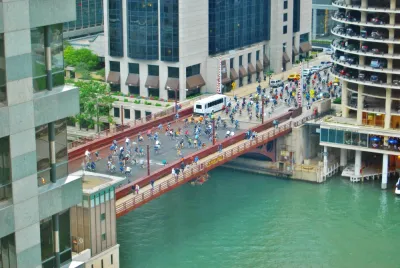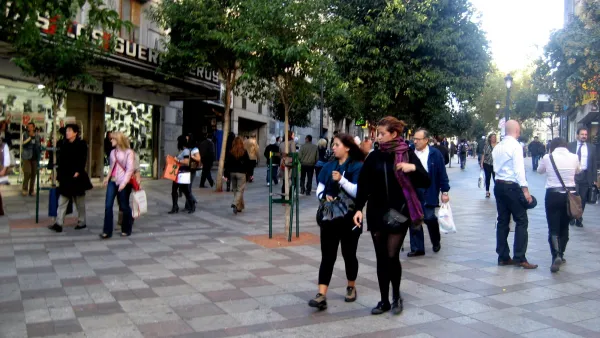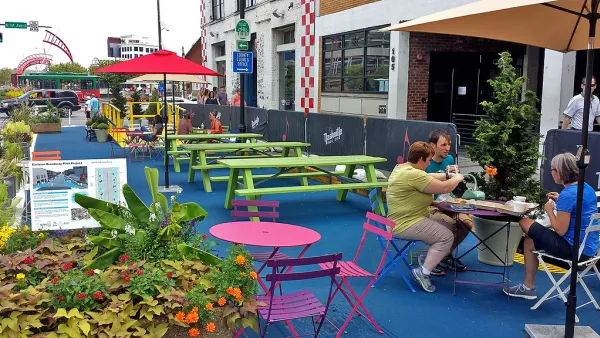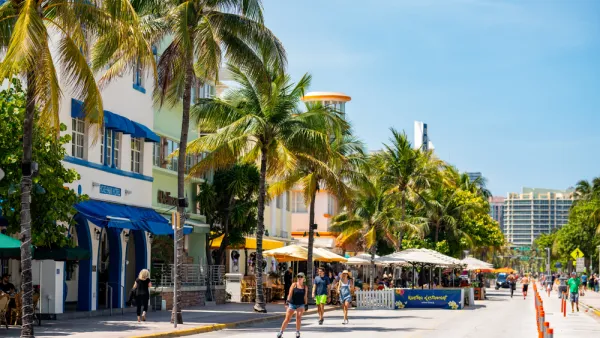Citing neighborhood concerns, the city is ending the Slow Street program on Leland Street as more parks and beaches reopen, but advocates want to see more permanent traffic calming measures.

During the pandemic, Chicago's Leland Street became a 'Slow Street,' letting residents use the space for walking, biking, and other active recreation and transportation. As John Greenfield reports, last November, the city dismantled the traffic calming infrastructure for snow plowing season, bringing it back in the spring. But "this year all of the traffic barrels and barricades were removed right after Labor Day, about three months earlier than last year. That’s despite the fact that it’s currently absolutely perfect for walking, jogging, and biking on streets where active transportation and recreation is made safer by banning motorized through traffic."
According to 46th Ward chief of staff Tressa Feher, "comments on a community survey and on Facebook indicated that 'people really like the idea of slowing [drivers] down, but there were problems with drivers not knowing where to go and the barrels getting moved around.' She went on, '[w]e want to talk to CDOT about other ways to calm traffic. If we can get better, more permanent infrastructure, I think people would really like that.'"
Although the street saw a 350 percent increase in foot traffic in 2020 during the Slow Street pilot, Alderman Matt Martin (47th) says "[t]his year, however, did not see as significant a use by pedestrians – likely due to the end of the Stay At Home order and the reopening of the lakefront, parks, and playgrounds." But advocates argue the traffic calming measures still benefit the community by encouraging bicycling and reducing car traffic.
CDOT plans to expand bike infrastructure in other parts of the city, such as the Leland Neighborhood Greenway, slated to be installed next year. "That facility will include contraflow bike lanes that will allow cycling in both directions, plus sidewalk bump-outs to shorten crossing distances, bike-friendly speed bumps, and raised crosswalks."
FULL STORY: Despite 85% increase in cycling on Leland, Slow Street was taken down 3 months early

Analysis: Cybertruck Fatality Rate Far Exceeds That of Ford Pinto
The Tesla Cybertruck was recalled seven times last year.

National Parks Layoffs Will Cause Communities to Lose Billions
Thousands of essential park workers were laid off this week, just before the busy spring break season.

Retro-silient?: America’s First “Eco-burb,” The Woodlands Turns 50
A master-planned community north of Houston offers lessons on green infrastructure and resilient design, but falls short of its founder’s lofty affordability and walkability goals.

Test News Post 1
This is a summary

Analysis: Cybertruck Fatality Rate Far Exceeds That of Ford Pinto
The Tesla Cybertruck was recalled seven times last year.

Test News Headline 46
Test for the image on the front page.
Urban Design for Planners 1: Software Tools
This six-course series explores essential urban design concepts using open source software and equips planners with the tools they need to participate fully in the urban design process.
Planning for Universal Design
Learn the tools for implementing Universal Design in planning regulations.
EMC Planning Group, Inc.
Planetizen
Planetizen
Mpact (formerly Rail~Volution)
Great Falls Development Authority, Inc.
HUDs Office of Policy Development and Research
NYU Wagner Graduate School of Public Service




























